Willie Ney:
It’s one of those things where, all the time, you know “What is spoken word?” and, “What’s hip-hop theater?” You can only explain it so much because you have to experience it.
Tiffany Ike:
[sighs]I don’t think God
would go to college
He is too major
to settle in minor places
By no means,
under no Heavenly decree,
would he elect to crash and burn under 10,000 degrees
Hell
does not recruit
with pitchforks and tightrope,
does not congregate in mobs
at your front steps.
It sits in your classroom,
tells you to turn to unrepresentative textbooks
passes out invites
to its kickbacks,
and always makes sure
as to forget
the back of the bus.
College
when you find yourself
parked in one
you learn more
from the burning in your throat
than the education
taught in limbo
it is a matter of time
that we realize
that time did not heal
all who matter.
Time did not have our backs
Time did not keep history
from turning us into stars,
shooting fireworks
like it was dream
where you can only be red
or white
or I can’t breathe blue.
This is the type of learning that’ll light a fire in you.
[electronic hip-hop music]
Voiceover:
Hip-Hop U was funded in part by Bill and Jan DeAtley, Joe and Mary Ellyn Sensenbrenner, Evjue Foundation, American Family Insurance Dreams Foundation, Wisconsin Arts Board, and Friends of Wisconsin Public Television.
Deshawn McKinney:
Just First Wave existing in this space at University of Wisconsin- Madison and in academia in general is one of the most hip-hop things that I’ve ever seen. You know? Like, it’s not supposed to be here.
Zhalarina Sanders:
In the ’70s when hip-hop was born, the entire purpose of the culture was to make sure that people still had access to resources and outlets that were being cut out of schools.
Michael Penn:
It’s a cultural movement started by lower-income poor black and brown people, that’s literally responsible for, like, an overwhelming majority of the culture and content that you consume, period.
Michael Penn AKA CRASHprez sings “DMC JR.”:
You can’t rock with my regime
Boy, you’d suffer on the scene
I keep Dasani in a double cup
Sober kid sippin’ clean
Mountaintops in my dreams
You could never kill the king
I’m grippin’ death
by the throat
Throw it in the choke,
hit the guillotine
Bumbaclot, you don’t get the sentence
Mackenzie Berry:
There are examples of other programs of other university and college programs that have hip-hop in them, but as far as offering a full-tuition scholarship for it and bringing students and recruiting students for it, I don’t know of any other programs that do that at the undergraduate level.
Chris Walker:
So, what is the role of this hip-hop-centric program on a “Research I” campus? The UW, you know, is founded on this idea of sifting and winnowing, getting down to the truth. And hip-hop centers itself around solving that same problem.
Danez Smith:
[reading excerpt of their poem “Dear White America”]
… their flesh & blood re-gifted their children. i’ve left Earth, i am equal parts sick of your go back to Africa & i just don’t see race. neither did the poplar tree. we did not build your boats (though we did leave a trail of kin to guide us home). we did not build your prisons (though we did & we fill them too). we did not ask to be part of your America (though are we not America? her joints brittle dress ripped, dragging her dead child through Oakland?) i am sick …
Danez Smith:
My name is Danez Smith and I was in the first cohort of First Wave, OGs, and I graduated in 2012.
[on stage] She was screaming at the mountaintop
I was very excited to be part of something new. Really, what I was excited was about that somebody was going to pay my tuition because I liked poems. And that seemed like a crazy stupid idea, but I was down to let them test it out on me. [laughing]
[synth notes over a hip-hop beat]
Willie Ney:
So, the first cohort of First Wave arrived to the UW-Madison campus in June of 2007. Basically, the vision was to bring students together to share with one another in a safe space to live in a community together in a campus environment so they could share their art.
Adey Assefa:
The pillars of First Wave, which we call the “three A’s”, are academics, arts, and activism.
[piano into medium tempo hip-hop beat]
Academics is pretty critical to this program. I think that over the years that pillar is probably the most constant because they’re a student here. You know, as part of this program, you’re on a scholarship.
Gia Euler:
We have 15 total scholarships that we have available to students. So every year, we’ve had anywhere between 14 to 15 students come in to each cohort. So we do call them ‘cohorts,’ as they come in. Currently, we just received our 11th cohort.
Group:
[in unison] Yeah!
Nia Scott:
First Wave says, “You hip-hop artists, you can be anything you want to be.”
Zhalarina Sanders:
It’s sort of like being an athlete on campus. That’s the easiest way I can describe it. So, like, athletes can major in whatever they want.
Deshawn McKinney:
I graduated in May 2015 with a Journalism Reporting Degree.
Michael Penn:
My degree from UW-Madison is in creative writing.
Nia Scott:
I’m an art major.
Mackenzie Berry:
I’m majoring in English-Creative Writing and I have a certificate in Afro-American Studies.
Jamie Dawson:
I study psychology and Afro-Am studies.
Adey Assefa:
The type of student we look for in First Wave are demonstrated leaders in their community.
Willie Ney:
We’ve done a phenomenal job, I think, vetting students who’ve come in, who really want to change the world.
Miona Short:
[“For All It’s Worth” by Miona Short]
[performs]
There are a thousand names for the black woman
Daughter of Ra
Daughter of Ankh-clad Sun God,
Africa mother,
fruits of civilization,
sister-womb man,
queen with a ‘K’,
and a host of other names
that smell like incense,
somebody else’s ancestors,
and gas station dashikis.
And then there are names that taste like the gritty rubber of pavement,
like a knee to the neck,
like somebody’s shit that they mistook for a burning bush,
and I choose not to say those names
because I refuse to scrub my tongue of its gold
just to entertain the air
with lies.
But if you must say my name
though,
hold up every letter,
every syllable
like a necklace
of diamonds
neither meant
for the adoration
nor the adornment
of your tongue.
So do not assume
that the gravity
of my name
was ever meant
to bow down to your English.
Instead, treat my name
like birds.
When you hear it in fleeting
flight across the soundscape
just let it fly there.
Let it be fly there
without entering
the lagging bumble of your voice
to detangle everything
that is nappy and free
about my name.
And on those moments
when my name perches
on the tongue
like a two-ton palace,
resist the urge
to be lazy.
Resist the urge
to respect me
with whatever
overarching pseudonym
while all the while,
refusing to unravel
the very raw
pulse of my name.
What I’m really trying
to say is
if you’re gonna call me
“Black Girl Magic,”
I prefer you just
call me by my name
I already know
my own alchemy.
I don’t need
no overcooked metaphor
for dark arts
and cryptic sorcery
to understand that
when my society gives me lemons,
I just use them
to keep my edges proper.
So if what you’re going after
is respect,
I suggest you just take
a trusted mug of Lipton
and the Book of Life
and sit down
and pore over
every black girl name
like a prayer.
And in
those inevitable moments,
when your mouth snags
the wrong sound
on the entrails
of our names
and we are quick
to correct you,
it might
hurt,
it may feel
like we’re being mean about it,
but you must understand
that our names tag the air
like permanent marker
so when you get it wrong,
you insult our formation
and we must
check you.
As black women, we are rekindling the gold standard
and calling it mirror
We are taking every
ugly, wrong, wretched moniker
and repurposing it
into ash
and that is exactly
how we will love ourselves
in a world that has
neither a throne, nor a crown,
nor a snap of praise
for any of us.
So if you must say my name,
first drape your words
in purple,
then ask
how I want my name to be said.
And I’ll tell you
to leave me to dance alone
all by myself
for me, my thousand sisters,
and our thousand skins.
And that, my loves,
is the proper pronunciation
of my name.
Miona Short:
My name is Miona Short and I’m a member of the seventh cohort of First Wave. I’m from Chicago, the south side particularly. I’m getting my degree in astronomy-physics and Spanish literature. So, my mom tells this story that when I was two years old, we saw a Kraft Cheese commercial. We were in our house, and she was doing my hair and I saw a cow jump over the moon and so I asked her, like, “Mommy, what is that?” The moon. And she’s like, “Oh, this is the moon.” And I was just like, “Cool. I want to go there.” [laughs]
And then she told me, she said, “Okay, well, you have to be an astronaut.” And then it was done. Then, I was going to be an astronaut. First Wave seemed like a great opportunity, to one: attend an excellent school that has a great astronomy program and also be an artist, a poet, and develop my craft here.
Adey Assefa:
She came in… “I’m a science major. I’m focusing on sciences.” And really stood proud in the idea of “Science does inform art and art does inform science.”
Miona Short:
My astronomy and my poetry, are… connected. They’re so connected they’re like adjoined twins in a way. Because the stars just by themselves, stars are just so poetic, stars are just literally like people, literally like people trying not to blow themselves away or collapse inward, just trying [laughing] to maintain an equilibrium, and that just– it translates into my art just so flawlessly and just without trouble and so a lot of people ask me, “Oh, it must be really hard to take concepts from math and physics and translate them on the page.” Not at all… It actually helps a lot. It really does.
Adey Assefa:
Miona is brilliant. “Brilliant” is the word I think about when I think about Miona.
Miona Short:
I don’t fit the mold of the physicist in a lot of ways. You know, most people have not met black women who have gone into this field. So I can understand the surprise, but I also am excited by the surprise, because it means that I’m rupturing something in their brains, I’m rupturing their ideas of what a physicist looks like, what an astronomer looks like. And you know… that’s me. That’s me.
[Onscreen text]
Miona Short graduated in May 2018. She is believed to be the first African-American woman to receive an Astronomy-Physics degree from UW-Madison.
 
Tiffany Ike:
We’re going to do this! Okay. [laughing]
Gia Euler:
Tiffany Ike and her sense of humor: um…
Chris Walker:
[laughing]
Adey Assefa:
Tiffany Ike, the queen of puns. [laughing]
Zhalarina Sanders:
Oh, my gosh, yes. Tiffany is a goofball. Always writing and saying puns that are terrible. Terrible puns. Really terrible puns. I can’t– I can’t express that enough. [laughing]
Tiffany Ike:
[chuckling] I should size my mouth up for shoes, ‘cuz I won’t stop putting my foot in it.
I want to buy us matching shoes just so we can be ‘sole’ mates
In Wisconsin, there’s so much cheese, but no one is smiling. Uh, we’re going to stop. [laughing]
There’s quite a few. [laughing]
My name is Tiffany Ike and I’m in the eighth cohort. Eighth co, great co. I’m from Houston, Texas. My major’s psychology and communication arts, with a certificate in digital studies. I’m definitely the story-teller of the cohort. People know that if you wanna hear a story from me, you gonna have to sit down for a little bit. I will give you all the funny details through the journey just to get to the destination. Sometimes people just want the destination. I’m not the person to go to. [laughing]
I came in here solely spoken word, solely poetry. I honestly don’t write poetry as much, as I’ve kind of moved back into that short story.
Gia Euler:
Typically, a First Wave student does not only have one talent. They have several.
Tiffany Ike:
[“Cross My Heart” by Tiffany Ike]
[sings]
Right before I close my eyes
I see the sun
High up in the sky
El-Shaddai up in the sky
As I lay right here tonight
I cross my heart
and hope to die
I cross my heart
and hope to die
I cross my hardened hearts
don’t survive
So I pray I don’t survive
So I’ll be made
into a new life
When the sun comes
Tiffany Ike:
Jasmine will yell “Deandre” and then the lights come up. And that’s when you start your monologue.
Ball & Chain was a play that I wrote and directed. And then when he says, “Iso, Iso, it leads you off to this.” It is a play about a boy named Deandre Washington.
Deandre Washington:
But what you’re describing is not me! What they’re afraid of is not me!
Tiffany Ike:
He’s a basketball player. And it kind of breaks down black men’s masculinity, ally-ship, what it means to survive in a society that doesn’t want you to exist.
Deandre Washington:
Can everybody just leave me alone about this draft? What about my dad? [sighing]
Look, I don’t care what he say! It’s my decision. I choose. You act like I gotta do whatever he says, like
Men speak in unison:
He taught me everything.
Tiffany Ike:
And the way in which I write tends to have a lot of symbolism, a lot of repetition, a lot of, like, puns and things of that sort.
Men:
Money is better.
Deandre Washington:
Jimmy.
Men:
Money is saved.
Deandre Washington:
Jimmy!
Men:
This is your fast break.
Deandre Washington:
Jimmy, I can do this at any time.
Adey Assafa:
It’s like, it’ll go right over your head unless you’ve actually sat down and talked to her about, like, some of the deeper meaning behind the names of the characters, or why the staging was a certain way or why some type of movement happened.
Men:
Don’t shoot, don’t shoot.
Adey Assafa:
It’s just all … There’s so much meaning to it and it just blows your mind. It’s brilliant, brilliant.[audience cheers and applauds]
Tiffany Ike:
It was really something I was really proud of, and I hope to continue creating things like that. [cheers and applause]
Shasparay Light:
I wanna give up, but then I remember someone needed this poem. Someone forgot that they were fighting for more than just their life. This art is activism. This is a reminder–even to myself–so you may be tired of hearing black poems, but art was meant to interrupt! And the work will never be done!
[cheers and applause]
Adey Assefa:
First Wave started out as mainly a spoken word artist program.
Gia Euler:
But we do have dancers. We have graffiti artists. We have DJs.
Willie Ney:
It’s become much more like a multicultural arts program.
Rain Wilson:
Rappers, singers, singer-songwriters, visual artists. So, we have someone that comes in as a poet and then they connect and get interested in dance.
[dancers breathe with exertion]
John-Paul Alejandro:
My name is John-Paul Alejandro. One, two, three, four. I am part of the 7th cohort of First Wave. I’m originally from the Bay Area of California. My major is dance, and I have a certificate in digital studies.
Instructor:
And you’re bringing your upper– kind of, like, with the arm.
Chris Walker:
This is a man who love dance probably as much as you love breathing in and out. Okay? [laughing]
You need to breathe in and out to survive. I believe John-Paul needs to dance to survive.
John-Paul Alejandro:
I got really involved with spoken word in high school. Believe it or not, I got admitted into UW-Madison as a biology major. And it’s, like, crazy to think that I went through all these majors and ended up with dance.
Adey Assafa:
He came in with minimal amount of dance experience but just had a love and passion for dancing.
[medium tempo hip-hop music]
John-Paul Alejandro:
All the professors know that I was not technically trained in contemporary or modern dance and ballet. But once I found that appreciation, I was able to put myself in those spaces and really thrive and exist. It just makes me feel great. There’s a moment in music in any music I listen to that I just close my eyes and I let my body just do its thing.
Chris Walker:
He is highly regarded by the faculty in the dance department and by his peers as a genuinely loving, sweet, nice person. But apart from that he works hard. He works hard and demonstrate growth. Semester after semester, year after year. What else could you ask for?
Zhalarina Sanders:
[“Tampa” by Zhalarina Sanders]
[rapping]
Uh.
Yo!
I come from that flirty dirty
That scurvy dirty
where the curry’s purty
eatin’ hotdogs in the church parking lot
my daddy four wheeler in three parking spots
you better come off that eggs and ham
and that turkey bacon on a lemon square
and that futuristic, that county fair
we got women flippin’ burnt hair
but it’s simple like a new day
or kool-aid when the crew’s paid
and everybody lookin on a Tuesday
for a girl name Keisha who do braids
we got fold out chairs in the back seat
I’m headed to my sister track meet
Red Lobster biscuits and applesauce
I got bologna burnin on a gas stove
And I been at the center of a city full of heat
You can tell them babies laughing by the
way they show they teeth/now if you lookin
for a party, just head out to the street/right
down in Tampa
Uh!
And if you catch me lookin decent
ridin cleaner than the mug
my daddy got sent away
so the hood just showin me love
Grandpa gave me his chain
cause gold is about as thick as blood
down in Tampa
Uh!
Where the sun shinin so bright, it’ll put you
to sleep/ aint no point in bringin crabs cause
our cookouts at the beach/ don’t come up in
my momma house actin like you cannot
speak/ right down in Tampa
Now, it’s too much fight in a crack dog
too much night in a black doll
but when girls look like black dolls
they drip swagu and mac sauce
we got welfare for the well’s fair
disrespecting your Ivy League
come home for a holiday,
now what’s a college degree to these collard
greens?
We Georgia peach, New York Giant
Havana, Cuba on the nightstand
Ybor city, casket drop to
my tattoo artist my hype man
And im’ma see you at choir practice
im’ma see you at Purple Passion
Yo!
“Im’ma kill Trell the next time
his ex come round and he funny actin”
I been at the center of a city full of heat
You can tell them babies laughing by the
Way they show they teeth/ now if you lookin
for a party, just head out to the street/ right
down in Tampa
[speaking] Ever since I was younger, people would be like “Yo, Sis … You gonna be my secret weapon, Sis … They not expecting a woman to have this much flow, be this good.” And I’m like, “You’re right, they’re not. It doesn’t seem like you expected it either!” Women are in hip-hop and we do it well. We do it really well! We do it better than a lot of other people. [laughing]
[rapping]:
Listen
Imma Florida orange/
I storm in the morn and perform/
with a chorus of horns
I was born in the corn, with a form
that’s quiet in the cold
but’ll swarm in the warm/
Nappy Roots, Nappy Roots,Nappy Roots
Three times in the mirror/
ride slow with my lil cousin holding the car
door, let my mixtape bang out your ears/
every other month is hurricane season/
we po’, we black, we ain’t leavin’
confederate flags on the ceiling
but them white folks eating out the hands of
my grandma every holiday season/
barefoot Goyamming,
still toe Jamming to Tom G/
you can find me, playing basketball in flip
flops in the middle of the street
Now, I been at the center of a city full of heat
You can tell them babies laughing by the
Way they show they teeth/ now if you lookin
for a party, just head out to the street/ right
down in Tampa
Listen!
Now if you catch me lookin decent
ridin cleaner than the mug
my daddy got sent away
so the hood just showin me love
Grandpa gave me his chain
cause gold is about as thick as blood
down in Tampa
Yeah!
Zhalarina Sanders:
My name is Zhalarina Sanders and I’m a member of the fifth cohort. I’m from Tampa, Florida. I currently have a degree, a bachelor’s degree, in psychology, and I am in a master’s program. It’s a counseling psychology master’s program.
[“Who Want It” by Zhalarina Sanders]
[rapping]
Abybay
Spittin’ pork shoulder
like it’s Labor Day
If my bars ain’t carbs or
All the good proteins and fats
You can’t take me out
the punchline, Li’l Daddy
[speaking] Man, I started writing raps–
[rapping]
‘Cuz waiting for some juice is hella whack
[speaking]
… younger than I probably remember. I want to say it was like seven or eight …
[rapping]
Who want it?
I put my life up in this track
It’s finally apparent
Audience:
That I had to go and lose my life to get it back
Zhalarina Sanders:
Who you see on stage is, like, who I am 24/7 but, like, tamed. Like, I contain it. And the stage allows me to be able to, like, be fully that, or be that in a way that is productive. It’s productive on stage. It’s not necessarily productive in a meeting, so I try, I try to find ways to channel that energy, but I’ve always been like that since I was, like, very little.
I’m writing an album right now.
[rhythmic bass]
The counseling program has, like, allowed for me to essentially have a conversation on a song with people. One of the biggest things that I’ve learned is that people suffer. Period. It happens, it’s a part of life. A lot of the time, arguably most of the time, when we suffer, we do so quietly and alone. And I want to be the enemy of that with my art. So I’m working on the completion and the release of my album. And I’m also working on the tour of my one-woman show.
[performing on stage]
Oh, Romeo! Horatio been acting mad-funny, though. I know your daddy died and the honey broke, but you had to kill the whole fam. And the money flow.
[audience laughing]
Chris Walker:
The show she did at the end of her undergraduate career, “Rose Gold,” moved through diverse characters and it’s very powerful.
Zhalarina Sanders:
So, the name of my play is “Rose Gold” and it is a 70-minute play in hip-hop theatre that explores black motherhood, mental health, specifically what it means to be black and woman at the same time in this country. And there are five characters and I play all five.
[performing]
Let that monster in your house may call mama, too!
[performing]
I would kill him before he ever–
[performing]
You would hold her down and take turns.
[performing]
How could you say that?
[sobs]
How could you say that to me? It is very hard. It is also a lot of fun.
[laughing]
Adey Assefa:
Zhalarina is one of those people that I think everyone admires. She is true to her values, true to her goals, and very determined and hardworking and compassionate, just like one of the most compassionate people I know.
Zhalarina Sanders:
I think just having a conversation with me humanizes hip-hop for people who have that sort of preconceived notion of what it means to live and engage and practice the culture of hip-hop.
[rapping]
I’m just a wolf
who smiles and speaks politely
Angles on angles on angles
I’m just a wolf who smiles
and speaks politely and…
[audience cheers]
[rapping]
Uh!
‘Cuz everything around me
is broken
[speaking]
Because I’m a graduate student, white people call me articulate all the time.
I have locs. I rap. I’m a rapper. And that intersection of identities confuses and pleases people who have this understanding of hip-hop that is warped.
[rapping]
Gravity won’t bring me
to the ground.
[claps]
[rapping]
Uh, uh!
I think that–
Deshawn McKinney:
Dealing with all these things in a space that doesn’t really understand you, I think that’s where a lot of the challenges come in. And how do I explore, say, my blackness in this very white space that’s UW-Madison? How do I bring my culture into this space that’s UW-Madison?
Protester:
We’re outnumbered.
Crowd chants:
Hands up, don’t shoot!
Protester:
We have hearts. We have purpose. No one can take that away from us. No one will ever take that away from us.
Crowd chants:
Hands up, don’t shoot! Hands up, don’t shoot!
Miona Short:
Activism is certainly important in First Wave. It is our third pillar.
Tiffany Ike:
It is basically using your voice to talk about things that matter to you and that matter to others.
Jamie Dawson:
You just want to do it justice. You don’t want to overstep and tell someone else’s story. But truly connect to how you feel and what you want to see be better.
Mackenzie Berry:
First Wavers do a variety of things on campus and in the community.
Rain Wilson:
They do their research when we get a performance gig request, and they take that information, channel it through their art, and then they go into the community and feed the community.
[sings]
Black soldiers marching one by one
Hurrah, hurrah
Black soldiers marching one by one
Seems to be the only time we’re allowed to hold a gun
And they all go marching on
Chris Walker:
As a rule, so as that we remain responsible to the subject matter that we are presenting, 99% of First Wave performances are followed by an audience talk back with the artists.
Rain Wilson:
There are a lot of conversations that are really difficult to have.
Chris Walker:
It is important for us, significant, to create that space, to engage around this idea, this subject matter, this uncomfortable truth.
Deshawn McKinney:
Art is a lot more universal of a language so you can reach people through a poem and bring people in to then sit at the table and have this dialogue.
Miriam Coker:
[performs]
Black people are dropping off the sky like flies.
No, like bodies!
No, like flies!
No, like cats and dogs!
No!
No, no! Black people
are worth less than them.
So, dropping
off the sky like bodies–
No, like stars.
And no one
is wishing on them.
Black boy has skin
like the night sky.
Carries the world,
and wears it as a hoodie
[“Raise the Bar Cypher” by John “Vietnam” Nguyễn]
John “Vietnam” Nguyễn:
[rapping]
[deep voice] R Production.
This hip-hop activist
Spits everything
he has to give
Consequently “dope” would
be an understated adjective
Whack MCs
will try to diss
Zhalarina Sanders:
He was a native of Chicago and came to UW-Madison as part of the fifth cohort, so he was my cohort brother.
Chris Walker:
Fifth cohort, legendary cohort. John Vietnam worked– I didn’t even know he had insomnia, but he worked constantly. There was always a poem to review, always an idea to go over.
Adey Assefa:
I think if you were around John you were like, “I got work to do,” or like, “I really–I have to step my game up.”
Michael Penn:
I remember watching his demo tape and being so jealous because he had four things he was amazing at and he shot it all himself. Like, this man did everything. I was so jealous I’m like, “How the hell am I in accord with this man?”
Zhalarina Sanders:
And so, he was the dude that finished an album in the same semester that he got a 4.0 and volunteered at a community center somewhere in the city, but didn’t tell anyone because he was, like, just humble.
Jonny “Vietnam” Nguyễn:
[“If a Minute Would Reverse” by John “Vietnam” Nguyễn]
[rapping]
We need change
But change starts wit’ you
We gotta work on ourselves
Even though
I know it’s hard to do
If I could wind time
so a minute would reverse
Then fix decisions
and revisions
With a minute to rehearse
[solemn drum machine beat]
[Onscreen text]
On August 30, 2012, John “Vietnam” Nguyễn died while saving a friend from drowning in Madison’s Lake Mendota.
Zhalarina Sanders:
I started a Google document in my dorm, and put The JVN Project at the top.
[Onscreen text]
The JVN PROJECT was officially organized in October 2012.
Zhalarina Sanders:
There was a lot of conversation at the time of people trying to figure out what to do to honor his memory, and just celebrate his life and legacy.
[John “Vietnam” Nguyễn writes on whiteboard]
If you can inspire change with music and poetry, you have been a service to your community.
[upbeat hip-hop music]
Zhalarina Sanders:
So now The JVN Project is a non-profit organization that seeks to use hip-hop as a tool of empowerment. Our work is inspired by the work or the life of a First Wave student and when The JVN Project was started, it was started by First Wave students. JVN Day is a hip-hop festival that happens every year around or on the anniversary of John’s passing. It is a cluster of things, but the intention of this festival is for people to celebrate the power of hip-hop, and how much good has been done and can still be done with the genre and the culture of hip-hop. Our flagship initiative is the One Life workshop series which is in all of the high schools, and some of the community centers in the city. That’s an after-school program where students can come and learn how to write or have a space to write creatively. They can write poems. They can write raps. They can write short stories. But that space is for them.
Adey Assefa:
I can’t say enough about how impactful that’s been to our community and to the Madison community. She made sure that his legacy continues to live on with the thing that he was most passionate about which was hip-hop, using hip-hop as a tool for a change.
Danez Smith:
[performs]
Beating each other into hospital beds and caskets.
Our punches were like sirens.
Our kicks, off-key pianos
and grandma was screaming like broken dreams
dropped from the hands of children
‘cuz she already knew that
fists never had anything good to say
until we was all dropping like flies.
Danez Smith:
When I first showed up into Madison, I wrote a lot of poems about other things in the world. I would give you 8,000 poems about whatever was on CNN at the time, but I didn’t really know how to say something about myself. So, part of my journey in First Wave was learning how to become comfortable laying bare my own story so that others could see it, and so that I could even see it in a new way myself. My most recent work is a collection called Don’t Call Us Dead which centers around thinking about mortality and how it manifests in the black body two different ways. How it makes tradition and economy and sport out of the murder and suffering and oppression of black people. And the other strain in the book thinking about mortality is thinking about queerness and my sexual history and also my diagnosis with HIV. In 2014, I was diagnosed with HIV, and a lot of the poems just sort of center around my, like, sort of dealing with touching my mortality in this new and a little unexpected way.
[“it won’t be a bullet” by Danez Smith]
[performs]
I’m not the kind of black man who dies on the news. I’m the kind who grows thinner and thinner and thinner until light outweighs us. Family gathered around my barely body telling me to go toward myself.
[applause]
[cheers and applause]
Gia Euler:
I feel that a lot of our First Wavers, whether they want to or not, are kind of thrown into being the educators of a variety of different things on campus.
Tiffany Ike:
What I love about this program is that we’re quite outspoken. And so, when we do not like something, we will let you know.
Deshawn McKinney:
[on megaphone]Understand that in order for this campus to improve it needs to improve for everyone.
Crowd:
Yeah! Whoo!
Deshawn McKinney:
Now, I …
John-Paul Alejandro:
You best believe First Wave students are there willing to stand and charge, willing to protest, willing to walk down streets, willing to hold up signs because at the end of the day, this is what we do.
Adey Assefa:
We have a lot of faculty who let us know, “Hey, I’m teaching this class. We’d love to reserve a couple of spots for First Wave students because we really want those students in our class. They move the conversation. They really get people to think. They’re not afraid to kind of put something out there that maybe people are thinking, but not able to say or articulate.”
Nia Scott:
“Like, hey, what you just said, was low-key sexist. And not okay.”
“Hey, what you just did was fetishizing Asians. Maybe you shouldn’t do that.”
Rain Wilson:
Help them to know what white privilege is. Help them to understand what, what sexism is and how it plays a part in their life and how they can break that chain. These students are just doing some marvelous things. And for to be happening in Madison … I think Madison, more than many other places, needs it desperately.
Zhalarina Sanders:
Wisconsin is wonderful, Madison is beautiful. It’s an awesome city and it has a lot to offer. A lot of us experience significant culture shock and homesickness.
Gia Euler:
It can be challenging for a lot of our students of color and underrepresented students, including our LGBTQ and transgender students. It can be a big adjustment.
[Onscreen text]
In fall 2016, UW-Madison conducted a campuswide survey to better understand students’ experiences regarding CAMPUS CLIMATE and DIVERSITY.
Patrick Sims:
There’s a set of experiences that are different for students who come from historically underrepresented backgrounds, or what we call our “students of color.” Individuals who are transgendered, individuals who are part of LGBQ community. Those groups, on average, had less favorable experiences.
[Onscreen chart]
Felt welcome on Campus
Students overall: 81%
LGBQ students: 69%
Students of color: 65%
Trans & nonbinary: 50%
Source: UW-Madison Campus Climate Survey Task Force Report: 10/30/2017
Danez Smith:
This is a very tough place to be a student of color. I’m from the Midwest. I’m from St. Paul which is about as Midwestern as you can get. You know:
we’re like ‘hotdish‘ and you know … [laughs]We’re like ‘hotdish’ and, like, negative 30 degree weather. And I feel like I know the Midwest and even I had a culture shock when I came to Madison.
Willie Ney:
The racial climate is kind of unbearably difficult and the students rely on one another and kind of the support system to stay here.
Miona Short:
I still feel out of place. I have people that I’m close to and that’s been good enough for me but belonging here, that’s a strong word for what I feel.
Deshawn McKinney:
I’ve certainly felt misunderstood and I’ve dealt with microaggressions and things. The being in class and alright it’s time to form groups and everybody turns away from you and you’re the one left sitting there, or nobody sits by you in lectures.
Jamie Dawson:
Like, I’m from the south and people always love to talk about it, especially up here. Up in the north, they love to talk about how much the south is racist and you don’t want to live there, but there’s the same problems up here. They just wear different coats and different masks.
Rain Wilson:
The struggle that some of these students have, being called “nigger,” being pushed around, put off the bus, being spit on, being in classrooms with professors who need so much more knowledge and heart around how to work with students that don’t look like them.
Nia Scott:
And that’s the world that we’re in! Where I have to go to a class and defend why my life matters, as if it’s a discussion, as if basic rights are a discussion.
Zhalarina Sanders:
And then, after you tell somebody you’re in Wisconsin from Florida the first thing they say is, “Why? Why here?” There are tons of universities in warmer climates. You know, what I say is, “I was accepted into a program here at the University that’s the only one of its kind.” So it’s like building this narrative and this interest and they’re like “Oh, what’s the program? That’s the only one of its kind?” I say “Well, it’s a hip-hop and urban arts learning scholarship program.” And one time when I was sharing this, my Lyft driver was really quiet after that, just didn’t respond. Interest was deleted. It just … The conversation stopped. And after about probably the longest two minutes I’ve ever experienced in a car, he said “Well, yeah, I guess they’re letting anything into universities these days.”
Patrick Sims:
I think culturally speaking some of our students of color have a difficult time adjusting because there’s a cumulative experience, right? So there are things that may have happened before they set foot on campus or things that read in the paper or see on television that give pause or reason for concern. And we’re now away from home, our family infrastructure. And I don’t necessarily know if there are people who will have my best interest at heart, first and foremost. So there a sense “You kind of have to fend for yourself” and that can be incredibly challenging.
Shasparay Light:
Straight-up, we are some activists. And you know, even–I know that there’s an assumption that we should be docile and, you know, be grateful. Like everyone says, “Be grateful for what you are given.” But if we don’t even challenge things within the university or within our division or within our program, how can we expect to change the world, right? It’s necessary for us to speak up for ourselves. Because if we don’t, who will?
[Onscreen text]
First Wave Executive Director Willie Ney retired in the summer of 2017. Soon after, the Department of Diversity, Equity and Educational Achievement announced that First Wave would take a one year recruitment hiatus.
Mackenzie Berry:
So, the First Wave program is under review.
Shasparay Light:
They’re pausing applications for a year for the scholarship.
Patrick Sims:
This is not about any lack of fiscal resources for the scholarship programs themselves. A hiatus in the recruitment, not the program, but in the recruitment for the program is a good thing because it finally gives us the time to actually plan.
Adey Assefa:
I think it’s a really good time to really revisit that, go back to our mission and think about what it is we’re trying to do.
Willie Ney:
Which to have that year off is, is, I think, was probably a big mistake. There’s a trust level, “Is it really real?” “Hey, is it real?” “You didn’t have it last year,” you know.
Patrick Sims:
The program is definitely continuing. I mean, there’s no doubt about it, but it is simply to pause and put in criteria that makes sense for us. I think there’s an opportunity to better capitalize on the resources that our faculty represent.
Nia Scott:
If they did take away the hip-hop elements, I would not be surprised.
Patrick Sims:
You know, so that’s one of the more debated pieces. Personally, I don’t see it changing, but I think there’s a conversation to be had about the degree to which we actually can meet that.
Zhalarina Sanders:
That wouldn’t be First Wave. That’s … I can’t express that enough. That is another program that’s probably great and awesome, but I would recommend a name change because the entire point of First Wave was hip-hop.
Patrick Sims:
I think, if you’re going to have folk expect that outcome you need individuals who are professionals in that field doing that kind of work, so really amazing artists who are on the cutting edge. I think I can say that categorically we aren’t hip-hop heads, right? So we’re having to build a case to attract individuals who have that expertise and will want to enter an academic setting to continue that work right. That’s the conundrum.
Willie Ney:
They themselves, the First Wave students are the future academic leaders of hip-hop studies, hip-hop arts. There’s no one to train them in those forms. So they are the DJs, they’re the rappers, they’re the MCs who will become professors, right?
Michael Penn:
Just don’t take the hip-hop away. Don’t strip it of what it was, what it is, what it should remain. Don’t erase it.
Miona Short:
When Rock’n’Roll first came out, it had limited social value in an academic space because people who ran academia just didn’t understand it, just didn’t get it and I think as hip-hop approaches its middle age … [laughs]right now, I think it’s time for academia to recognize what a valuable asset this art is.
Patrick Sims:
The concern, the angst is real. I hear it. And at the end of the day it is in service of strengthening program to position us to be the best. And we’re good right now. We’re darn good right now. And in some ways that’s a blessing and a curse all rolled into one because the work is stellar, and stellar as it is, I know it can be ten times better.
[Onscreen text]
After the one year hiatus, UW-Madison resumed accepting applications in August 2018 for the next cohort of First Wave.
Chris Walker:
As the former artistic director of a program, I’m very proud of what we were able to accomplish in those early years. And how the program has continued to evolve and grow in the two years since I’ve left. What we have is a program of international recognition.
John Paul Alejandro:
I have no regrets. First Wave has given me a lot more than I thought I was going to get and being able to thrive in the field that I am in–I can’t–you know, I have to thank First Wave for that.
Tiffany Ike:
I think the biggest thing I’ve learned a lot about is what it means to be in friendships, relationships, like, all the “ships.”
[singing] Whoo-oooo-ooo
Group singing:
Yes.
Zhalarina Sanders:
Like, I met people in Wisconsin that I would likely send an invitation to my wedding [laughs] before a blood relative. Okay!
Gia Euler:
I never get tired of seeing the talent. I’m jealous of the talent [laughing] that our students have.
Adey Assefa:
And the creativity. I mean all of that is just … [exhales audibly]
Deshawn McKinney:
Folks like Danez Smith, who literally just won every award ever.
Danez Smith:
So yeah, my new book is nominated for the National Book Award, which is crazy.
Deshawn McKinney:
I’ve won big scholarships recently for grad school, the Truman Scholarship and the Marshall Scholarship. Winning those meant a lot for me ‘cuz I did it not just for me but for the larger communities both on campus and beyond. I’ll be going to the London School of Economics and Political Science to get a degree, a master’s in Social Policy and a second degree in something as yet to be determined.
Chris Walker:
Don’t be surprised if you are voting for him as president one day.
Zhalarina Sanders:
The JVN Project achieved 501(c)(3) status on May 10th, 2017. So now we are a 501 (c)(3) nonprofit organization recognized by both the federal government and the State of Wisconsin.
Miona Short:
The connection that we have to Danez, you know, the connection that we have to Rina’s success in doing The JVN Project. The connection that we have to Deshawn, living in London now, the connection that we have to Deshawn receiving the Marshall scholarship. You know, it’s such a communal celebration.
Group:
Whoo! Whoo! Whoo!
Deshawn McKinney:
First Wave is a part of hip-hop history. You can’t write the story without talking about First Wave because it’s made its way into higher education and so it’s forever a part of that.
Rain Wilson:
I can’t imagine what the university or what Madison would be without the voice, the loudness, the brilliance of First Wavers.
Miona Short:
I’m so proud! I’m so proud because we are doing such great things. We’re doing great things here and then, we leave and we fly. Like, we so fly. [laughs] You know what I mean?
Isha Camara:
We are …
Crowd:
First Wave!
Isha Camara:
We are …
Crowd:
First Wave!
Isha Camara and crowd:
First Wave!
[“Raise the Bar Cypher” by John “Vietnam” Nguyễn]
[deep voice] Production.
This hip-hop activist
Spits everything
he has to give
Consequently “dope” would be an understated adjective
Whack MCs
that’ll try to diss
It always ends in tragedy
Many rhyme my craft, but
only half can pass the mastery
Seek balance
That’s a prophecy
After I rock ’em probably
Never comprehend
If only I could say immodestly
Need time to write
Know which beats
rhymes with light
Try to sell me a dream
I don’t believe all the hype
The differences in rhythm
Here to spit with precision
Every syllable I fit in
Just to pick
this higher vision
I got fire
where the chest is
Every verse
is cardiac
Every scripture
went and
trippin’ truth
And that’s
the artifact
From analog
to digital
MPC to mp3
juxtapose my dreams
What I wish to be
my memories
Spit to flip the typical
Deliver quick and critical
Hey, just grip the mic
until I manifest the spiritual
No time to sleep
I’ll miss the beat
Make history on microphones
Born to be a legend
And this test
to check the chromosomes
Deeper the roots
then the sweeter the truth
This is hip-hop speaking
for who needed the proof
[background vocals]
Da da-da-da da
Da da-da-da da
Da da-da-da da
Voiceover:
Hip-Hop U was funded in part by Bill and Jan DeAtley, Joe and Mary Ellyn Sensenbrenner, Evjue Foundation, American Family Insurance Dreams Foundation, Wisconsin Arts Board, and Friends of Wisconsin Public Television.

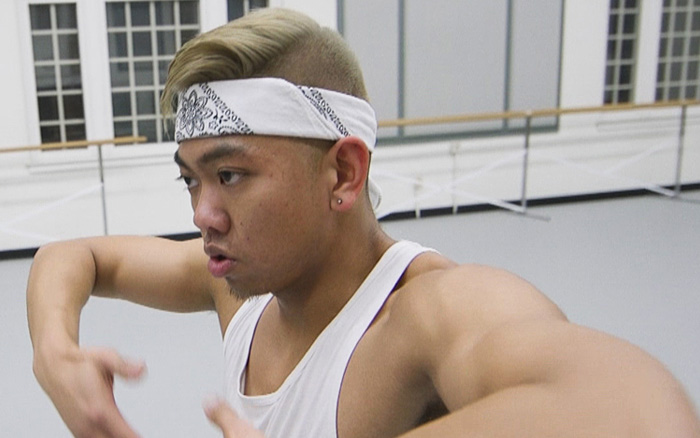
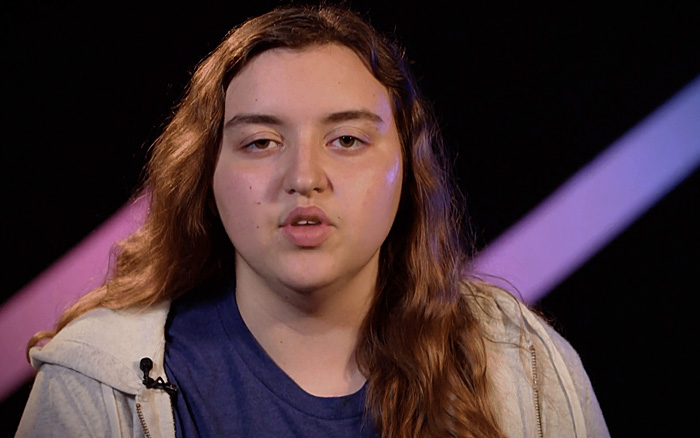
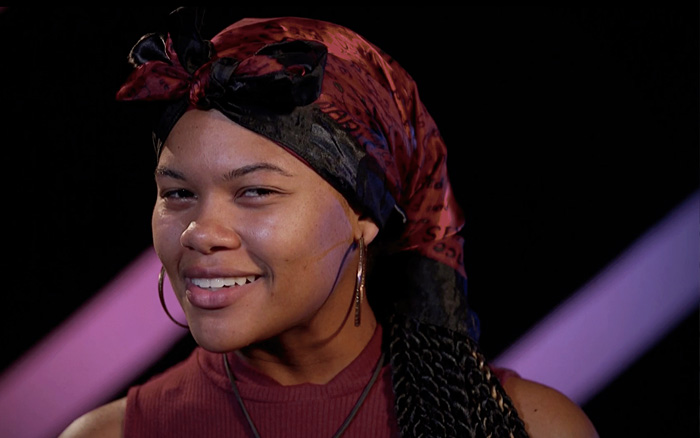
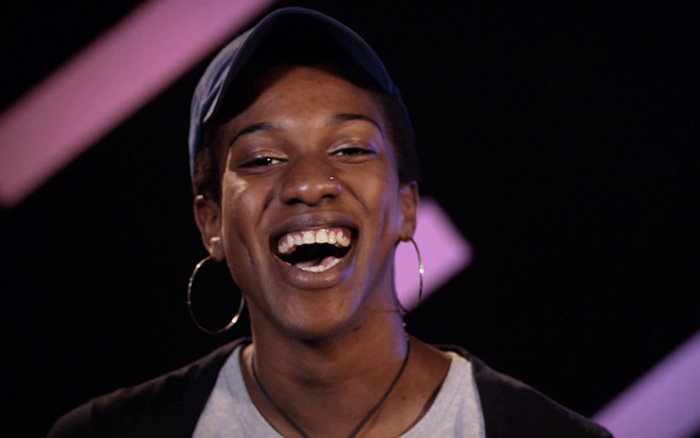
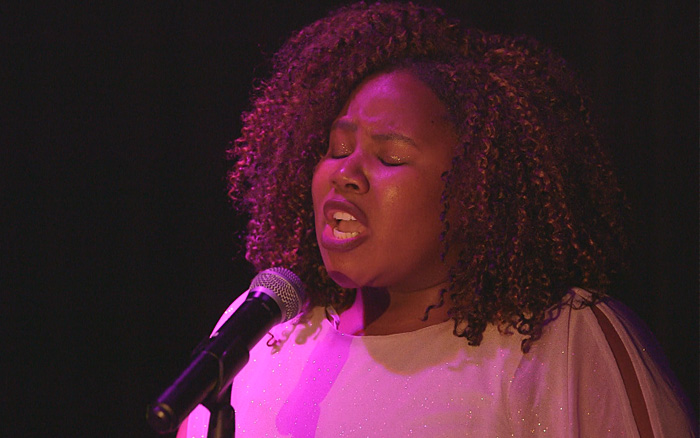
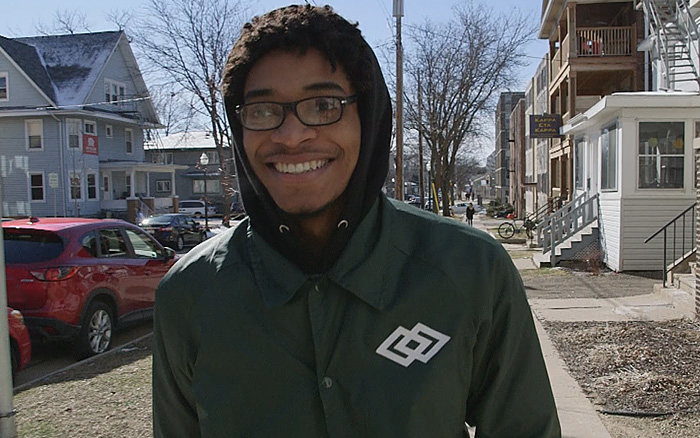
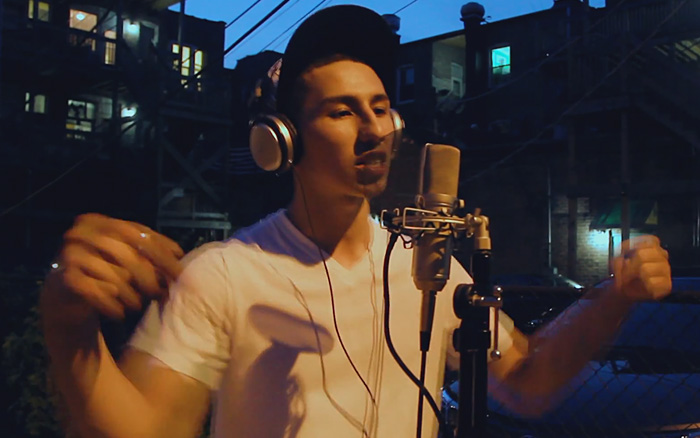
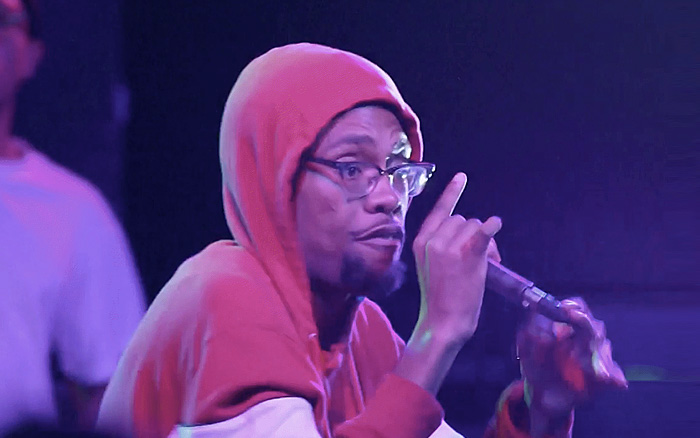
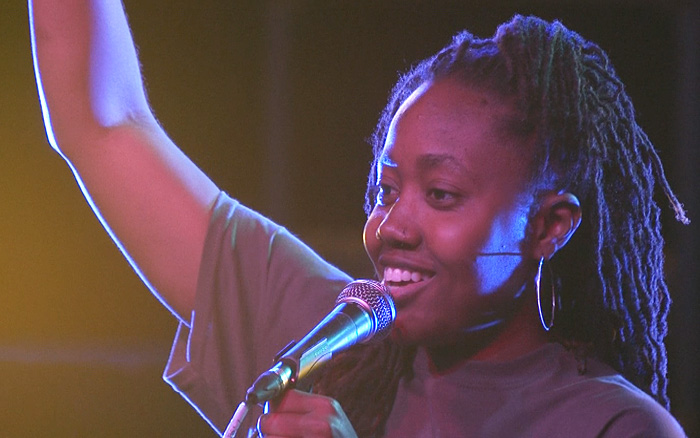
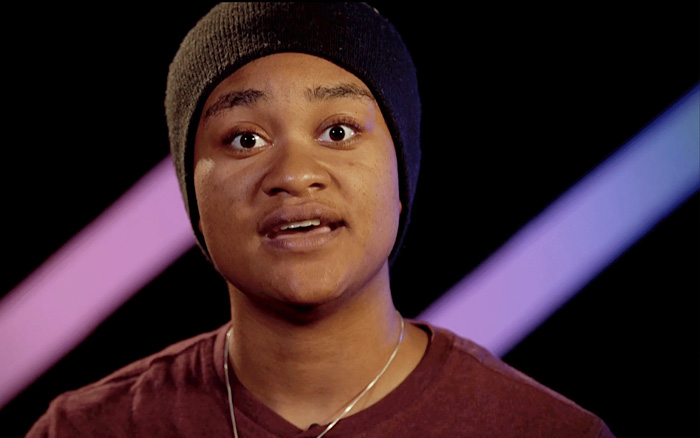
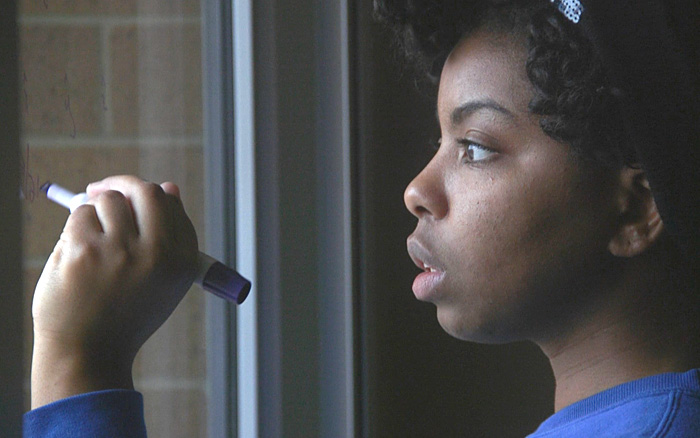
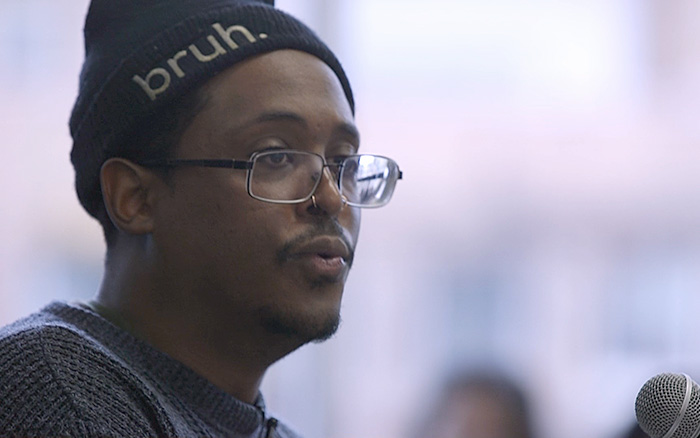


 Passport
Passport











Follow Us